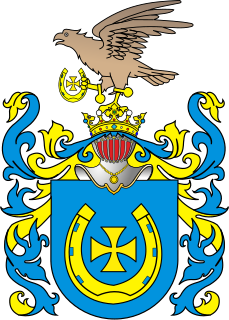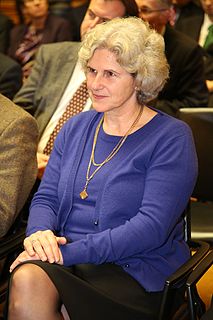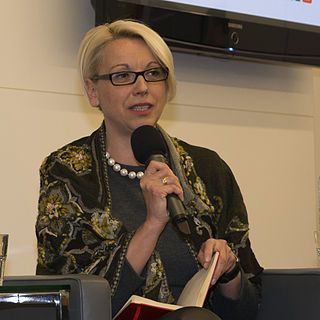
Taczanowski is the surname of a Polish szlachta (nobility) family from Poznań bearing the Jastrzębiec coat of arms and the motto: Plus penser que dire. They took their name from their estate Taczanów in the 15th century and by the 19th century were among the leading magnates in partitioned-Poland. Members of the family are historically significant religious, political, scientific, and military figures. The family was granted the title of count by King Friedrich Wilhelm IV of Prussia in 1857. The Austrian branch of the family, which spells the name Dassanowsky, came to Vienna with the forces of King Jan Sobieski during the Battle of Vienna in 1683.

Erhard Busek is an Austrian politician from the Christian-conservative People's Party (ÖVP). Throughout his political career, he was widely regarded as one of the leaders of the party's liberal wing. He is coordinator of the South-Eastern Cooperative Initiative (SECI) and chairman of the Institute for the Danube Region and Central Europe.

The Alliance for the Future of Austria is a right-wing populist and national conservative political party in Austria.
Dassanowsky is the name of the Austrian branch of the Polish noble magnate family Taczanowski which came to Vienna in 1683 and has produced notable figures in Austrian civic and cultural life. Dassanowskyweg in the 22nd District (Donaustadt) of Vienna was named in recognition of the family.
Same-sex marriage in Austria has been legal since 1 January 2019, following a decision of the Constitutional Court on 4 December 2017. The country has allowed registered partnerships since 1 January 2010.
August Friedrich Thienemann was a German limnologist, zoologist and ecologist. He was an associate Professor of Hydrobiology at the University of Kiel, and director of the former Hydrobiologische Anstalt der Kaiser-Wilhelm-Gesellschaft at Plön.

Snap legislative elections were held in Austria on 28 September 2008 to elect the 183 members of the National Council. The elections were caused by the withdrawal of the Austrian People's Party (ÖVP) from the governing grand coalition with the Social Democratic Party on 7 July 2008. Due to dissatisfaction with the grand coalition and the two main parties, it was widely expected to be a realigning election, with gains for the opposition and up to seven parties were expected to win seats.
Hermann Junker was a German archaeologist best known for his discovery of the Merimde-Benisalam site in the West Nile Delta in Lower Egypt in 1928.
The Ludwig Boltzmann Institute of Human Rights is a Vienna-based research institute affiliated with the Austrian Ludwig Boltzmann Gesellschaft, that specializes in the area of human rights.

Barbara Rosenkranz is an Austrian politician for the Free List Austria. She was a member of the Parliament of Austria, the National Council, from 2002 to 2008, where she served as Chair of the Committee for Health Affairs. Rosenkranz was the Freedom Party candidate for the Austrian presidential election in 2010. Rosenkranz received 15.62% of the vote, coming second after incumbent Heinz Fischer. Until 2017, she was a member of the Freedom Party of Austria.
A legislative snap election for the National Council in Austria was held on 28 September 2008. The previous election was held on 1 October 2006. The election was caused by the withdrawal of Austrian People's Party leader Wilhelm Molterer from the governing grand coalition on 7 July 2008. Due to dissatisfaction with the grand coalition and the two main parties, it was widely expected to be a realigning election, with gains for the opposition and up to seven parties expected to be in the National Council after the election. The losses for the government parties resulted in strong gains for the far right, while neither the Liberal Forum nor the Citizens' Forum Austria gained as much as 2% of the vote, defying earlier expectations. The result of the election was seen as strong for the far-right and in support of Eurosceptics.

Manfred Maria Porsch is a composer of Austrian contemporary worship music and a teacher.
A legislative snap election for the National Council in Austria was held on 28 September 2008. The previous election was held on 1 October 2006. The election was caused by the withdrawal of Austrian People's Party leader Wilhelm Molterer from the governing grand coalition on 7 July 2008. Due to dissatisfaction with the grand coalition and the two main parties, it was widely expected to be a realigning election, with gains for the opposition and up to seven parties expected to be in the National Council after the election. The losses for the government parties resulted in strong gains for the far right, while neither the Liberal Forum nor the Citizens' Forum Austria gained as much as 2% of the vote, defying earlier expectations. The result of the election was seen as strong for the far-right and in support of Eurosceptics.
A legislative snap election for the National Council in Austria was held on 28 September 2008. The previous election was held on 1 October 2006. The election was caused by the withdrawal of Austrian People's Party leader Wilhelm Molterer from the governing grand coalition on 7 July 2008. Due to dissatisfaction with the grand coalition and the two main parties, it was widely expected to be a realigning election, with gains for the opposition and up to seven parties expected to be in the National Council after the election. The losses for the government parties resulted in strong gains for the far right, while neither the Liberal Forum nor the Citizens' Forum Austria gained as much as 2% of the vote, defying earlier expectations. The result of the election was seen as strong for the far-right and in support of Eurosceptics.
The Karl Renner Prize, established on the occasion of the Austrian Federal President Karl Renner’s 80th birthday by the city of Vienna, is awarded to individuals or groups in recognition of merits for Vienna and Austria in cultural, social as well as economical concerns, acknowledged on a national or international level. Endowed with 43,600 euro, the prize is currently given to a maximum of six nominees every three years.

Angelika Rosa Mlinar is an Austrian politician and Member of the European Parliament (MEP) from Austria. She is a member of NEOS – The New Austria, part of the Alliance of Liberals and Democrats for Europe. She belongs to the minority of Carinthian Slovenes.
Florian Wenninger is an Austrian historian, dedicating himself mainly to the history of totalitarian regimes in the 20th century.

Kirchbach-Zerlach is since 2015 a municipality with 3,271 residents in the Südoststeiermark District of Styria, Austria. In 2015 the municipality was called Kirchbach in der Steiermark.

Gutenberg-Stenzengreith is a municipality since 2015 in the Weiz District of Styria, Austria. It was created as part of the Styria municipal structural reform, at the end of 2014, by merging the former towns of Gutenberg an der Raabklamm and Stenzengreith.










